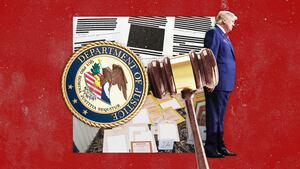First, she stopped FBI special agents from even glancing at the classified documents they recovered from Mar-a-Lago. Then she appointed a special court referee that former President Donald Trump wanted to slow down the investigation over his mishandling of classified documents.
But now, it’s clear District Court Judge Aileen Cannon already knew the Department of Justice was ready to hand Trump back a ton of personal records six days before she claimed the former president was suffering “a real harm” by being “deprived of potentially significant personal documents.”
The “medical records” she worried the feds might leak to the press—what she called a “risk of irreparable injury” to the former president—were actually a doctor’s note Trump himself made public when running for the White House in 2016 as part of a publicity stunt.
A description in court records indicates the feds were trying to return an addendum to the infamous, eye-rolling letter that a Manhattan doctor quickly typed up emphatically declaring, “If elected, Mr. Trump, I can state unequivocally, will be the healthiest individual ever elected to the presidency.”
Those details were made public when the court screwed up Tuesday night and posted a sealed DOJ filing on the public docket, which was quickly caught by Bloomberg reporter Zoe Tillmann.
The Aug. 30 letter to the judge, which is marked “sealed,” lays out the abundantly cautious way the DOJ treated its raid on Mar-a-Lago earlier that month. The FBI had a “privilege review team” of agents and lawyers conduct an initial sweep and sort through evidence to put aside anything that could taint an eventual prosecution of the former president—such as confidential letters between him and any of his 35 different lawyers.
In the letter, a DOJ lawyer representing that “taint team” explained that three weeks after the seizure of goods at the oceanside Florida estate, the team was ready to return 43 items that had nothing to do with the investigation: legal documents ranging from his confidential settlement with the Professional Golfers’ Association to invoices from his attorney Alina Habba.
The revelation makes even more obvious how far Cannon went to appease the president who gave her a lifetime appointment to the federal bench. And it’s only adding to what’s become a resounding consensus from legal scholars that Cannon is squarely on Trump’s side.
Trump lawyers, who’ve gone judge-shopping for her in the past, seemed to do it again when they filed this lawsuit to freeze the FBI investigation. Avoiding the South Florida magistrate judge who initially approved the search warrant and was already overseeing the matter, Trump’s lawyers marked the case as unrelated to other pending litigation—diverting this over to another judge and ending up with Cannon.
At the very first court hearing, Cannon signaled deep distrust of the DOJ and journalists. She expressed a belief that the FBI’s investigation of Trump for mishandling “top secret” records was somehow distinct from the federal government’s damage assessment over whether the nation’s secrets were put at risk. Legal analysts Teri Kanefield, Harry Litman, and others agonized over Cannon’s bizarre legal reasoning.
At every turn since, she has granted Trump’s lawyers exactly what their client wants most: time to burn.
“She's just giving him the delay that he’s asked for,” said Peter M. Shane, a legal scholar at New York University’s law school. “She has obvious sympathy for Trump’s contention that, as a former president, he deserves super-consideration.”
Trump’s lawyers wanted to hit the brakes on the FBI investigation. Cannon forbade the agents from reviewing the classified documents.
They wanted to appoint a “special master” to micromanage the DOJ and review whether any seized document could be considered a privileged presidential record or attorney-client communication. Cannon didn’t just appoint one—she picked the semi-retired judge they wanted.
Then, when Raymond Dearie turned out to be a no-nonsense arbiter who wanted to speed this process along—dangerously cornering Trump’s lawyers by telling them to formally explain whether Trump actually declassified these records—Cannon came swooping in out of nowhere to dial him back.
“This is how a judge would behave… if her motivation was simply to be helpful to Trump,” Shane told The Daily Beast.
The DOJ has already been moderately successful at appealing her decisions. The Eleventh Circuit, despite its conservative leaning, restored the FBI’s ability to keep reviewing the classified government records taken from Mar-a-Lago. And on Wednesday, the federal appellate court in Atlanta granted the DOJ’s pleas and agreed to expedite the appeal that could scrap the entire “special master” ordeal.
But while the case makes its way through that process, legal scholars worry Cannon will continue to micromanage her chosen micromanager.
“She seems to be cooperating quite well with the former president,” said Carl Tobias, a law school professor at the University of Richmond.
Dearie was once the top federal prosecutor in Brooklyn and went on to become a federal judge, including a seven-year stint on the coveted and hyper-secret Foreign Intelligence Surveillance Court, which is where the feds ask for judicial approval to conduct some kinds of spying on foreigners. His role in this case could keep it moving forward fairly, although some legal scholars are starting to worry whether he’ll stick around.
“This is a person who spent 38 years building his enormous reputation. If I were a judge for 38 years… I wouldn’t want to be ordered around by someone who’s a lackey to Trump,” Tobias said.
But her potential to harm the FBI’s investigation is far from over. Dearie’s role is merely to be a temporary referee to shepherd the potentially privileged document review process. His decision’s aren’t even final. Any conclusion he makes will still be submitted for approval to Cannon, who’s 37 years his junior and was a newborn in Colombia when he was already leading the U.S. Attorney’s Office in the Eastern District of New York while the crime rate was soaring.
Tobias stressed that every day the case remains with Cannon is a step in the wrong direction, noting that she should have done the right thing: recognized that this case was already an extension of the Mar-a-Lago search and transferred it back to Bruce Reinhart, the magistrate judge who approved the search warrant.
“I just don’t think she ever had jurisdiction,” Tobias said. “She could have kicked this back to the magistrate. To the extent this case had any validity, it belonged there—rather than have this. They forum-shopped to get her. It raises all kinds of issues.”










